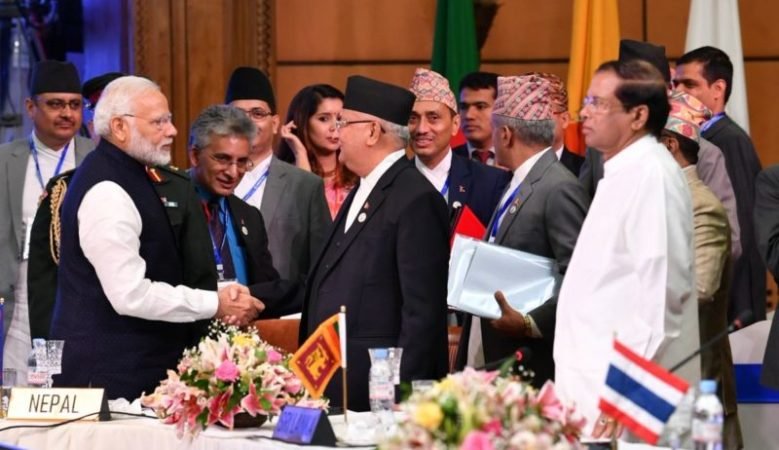Sub-regionalism in subcontinent: A reason for BIMSTEC over SAARC

Dealing with the unanticipated challenges triggered by the COVID-19 pandemic has had significant effects on people around the world. The COVID-19 pandemic is a wake-up call for multilateralism, especially regional cooperation. All the states are concerned about their present economy and the situations, and circumstances in the post-COVID world. More concerned are the least developed states and developing states, and Nepal is no exception to this. But the only mechanism that can redeem Nepal or any other state is cooperation.
Economic growth will be and needs to be, an ultimate part of any recovery strategy. However, growth is a means, not an end. In this emerging scenario, regional cooperation has to be shaped by considering scale, dependency and sustainability. To that extent, the South Asian Association for Regional Cooperation (SAARC) and The Bay of Bengal Initiative for Multi-Sectoral Technical and Economic Cooperation (BIMSTEC) is a viable platform for Nepal’s rejuvenation.

Nepal has always adhered the value of world peace and cooperation for mutual benefit. A restructuring and revision of Nepal’s foreign policy are required focusing on the cooperation and solidarity as a way forward in post-COVID-19 situations. Indian Prime Minister Narendra Modi’s initiative to establish a SAARC COVID-19 Emergency Fund has resurrected the importance of regional organization in South Asia. As South Asian Economic Focus estimated Nepal’s economic growth to be between 1.5% to 2.8%, the areas of cooperation in the SAARC which includes Human Resource and Tourism, Agriculture and Rural Development, Economic, Trade and Finance, Poverty Alleviation, Social Affairs and others, for which Nepal should be directed towards collaboration and solidarity among other South Asian states to tackle the future obstacles. Nepal can benefit from a concentrated and collaborative strategic plan for the future through SAARC to overcome the situation in future.
But in the past, the failure of SAARC to nurture cooperation in South Asia has pushed the regional players to search for an alternative. Nepal, in this case, can also benefit as a member state of BIMSTEC. BIMSTEC’s priority sectors also cover Trade and Investment, Energy, Tourism, Agriculture, Poverty Alleviation and nine other sectors, where Nepal can take advantage for economic revival through cooperation between the member states. Though Indian PM Modi has recently emphasized SAARC to counter pandemic, his “Act East” foreign policy prioritizes BIMSTEC. Indian Foreign Minister S. Jaishankar after his appointment has also referred SAARC to have “certain problems” while BIMSTEC was described as having both energy and possibility and a “mindset which fits in with that very optimistic vision of economic cooperation.” Hence, Nepal while regarding the regional cooperation platform for future impediments BIMSTEC is also a practical alternative for her prosperity.
In South Asia other than India, Bhutan and Nepal, Bangladesh is also a member of both SAARC and BIMSTEC. Bangladesh has been in recent years a vibrant economy in the region. In 2018, it fulfilled the United Nations standards for advancing from “least developed country” to a “developing country”. Bangladesh has actively participated in BIMSTEC proceedings to advance the goal of regional development, peace and stability. Similarly, Bangladesh has also focused on SAARC as a regional mechanism to fight poverty in South Asia.
In response to Indian PM, Bangladesh’s Foreign Minister Dr A. K. Abdul Momen also proposed for establishment of an institution to protect and fight the health threats in the region in the future. Hence along with India, Nepal should also cooperate with Bangladesh in the near future for economic prosperity. Both the states collectively and strategically should act for themselves, as well as for the whole region’s benefit in resurrecting the regional organizations.

Nepal and Bangladesh can highlight the presence of a fundamental paradox between the increasing demand for greater and better cooperation, and the willingness of the state to act collectively in the international community. Both states’ aspiration of economic growth should not let the “thinning of regional cooperation” in the post-pandemic situation, rather boost each other and help to form a strong regional organization to fight the current pandemic and revive the economy in post-pandemic circumstances. Nepal or any other states can benefit from regional cooperation and collaboration in every aspect to recover from the damages done by the pandemic instead of “forum shopping” in the international arena.
Nepal and Bangladesh (also India and Bhutan) as a common member of SAARC and BIMSTEC should have solidarity to escape the tradeoffs between “better recovery” and “quick wins”. The pursuit for quick wins might abandon and supersede vital priorities of sustainable development. Therefore, regional (development) cooperation needs to start with a “smart recovery” approach from the very beginning, and for which Nepal-Bangladesh cooperation can play an important role. Regional cooperation, during the pandemic and in its aftermath, has been presented with an opportunity to build a better approach for “smart recovery”, one that does not repeat the unsustainable arrays of the past.
Hence, the role of Nepal-Bangladesh cooperation along with India will be a spur in shaping the narrative of a new regional and sub-regional alignment. As a part of deeper realization for Nepal and other South Asian states would be to look within unexplored partnerships and strengthen their capacities through a greater degree of regional cooperation. So, Nepal should use the power of cooperation to benefit in the near future to overcome the dire situation. Overall, the leaders of the region should master the art of competing for prosperity while discovering common interest on which to collaborate.



















